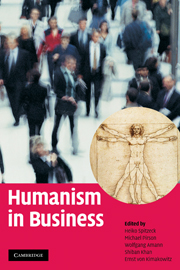Book contents
- Frontmatter
- Contents
- List of figures
- List of tables
- List of editors and contributors
- Acknowledgements
- Humanistic Management Network: paving the way towards a life-serving economy
- Introduction
- Part 1 Philosophic-historical grounding of humanism
- Part 2 Towards an integration of humanism and business on a systems level
- Part 3 Humanistic management
- Part 4 The individual as a change agent for a humane business society
- 19 Ethical codes at work
- 20 The daunting challenges of globalization and the power of individuals in cross-stakeholder networks for a humanistic face of globalization
- 21 The leader as responsible change agent: promoting humanism in and beyond business
- 22 Quiet leadership – a way to sustainable positive change
- 23 Everyone a changemaker: social entrepreneurship's ultimate goal
- 24 Social business entrepreneurs are the solution
- 25 Concluding observations
- Index
- References
20 - The daunting challenges of globalization and the power of individuals in cross-stakeholder networks for a humanistic face of globalization
Published online by Cambridge University Press: 25 January 2011
- Frontmatter
- Contents
- List of figures
- List of tables
- List of editors and contributors
- Acknowledgements
- Humanistic Management Network: paving the way towards a life-serving economy
- Introduction
- Part 1 Philosophic-historical grounding of humanism
- Part 2 Towards an integration of humanism and business on a systems level
- Part 3 Humanistic management
- Part 4 The individual as a change agent for a humane business society
- 19 Ethical codes at work
- 20 The daunting challenges of globalization and the power of individuals in cross-stakeholder networks for a humanistic face of globalization
- 21 The leader as responsible change agent: promoting humanism in and beyond business
- 22 Quiet leadership – a way to sustainable positive change
- 23 Everyone a changemaker: social entrepreneurship's ultimate goal
- 24 Social business entrepreneurs are the solution
- 25 Concluding observations
- Index
- References
Summary
The new world order and disorder
Towards the end the first decade of the twenty-first century, it is quite clear that things have not turned out quite as had been expected in those early euphoric years that followed the collapse of the Berlin Wall and what the American scholar Francis Fukuyama termed “the end of history.” Fukuyama did not, of course, mean that the world was coming to an end, but rather that the ideological confrontation between collectivism and individualism – translated in economic terms into the battle between the central command and control economy and the liberal market economy – had been irrevocably won by the individualist-oriented market economy, with all the social and political freedoms that it represents. For over two centuries the ideological battle had raged, resulting in millions of publications and, in real-life terms, the establishment of collectivist regimes under both fascist and communist rule throughout most of the twentieth century and all the harm they inflicted. With the deaths in the mid-70s of the Iberian fascist dictators, Franco of Spain and Salazar of Portugal, fascism as a system of state in Europe was finished. The fall of the Berlin Wall on 9 November 1989 presaged the collapse of communism. What the scholar Fukuyama called the end of history, the American president, George H Bush, termed “the new world order.
- Type
- Chapter
- Information
- Humanism in Business , pp. 341 - 357Publisher: Cambridge University PressPrint publication year: 2009

